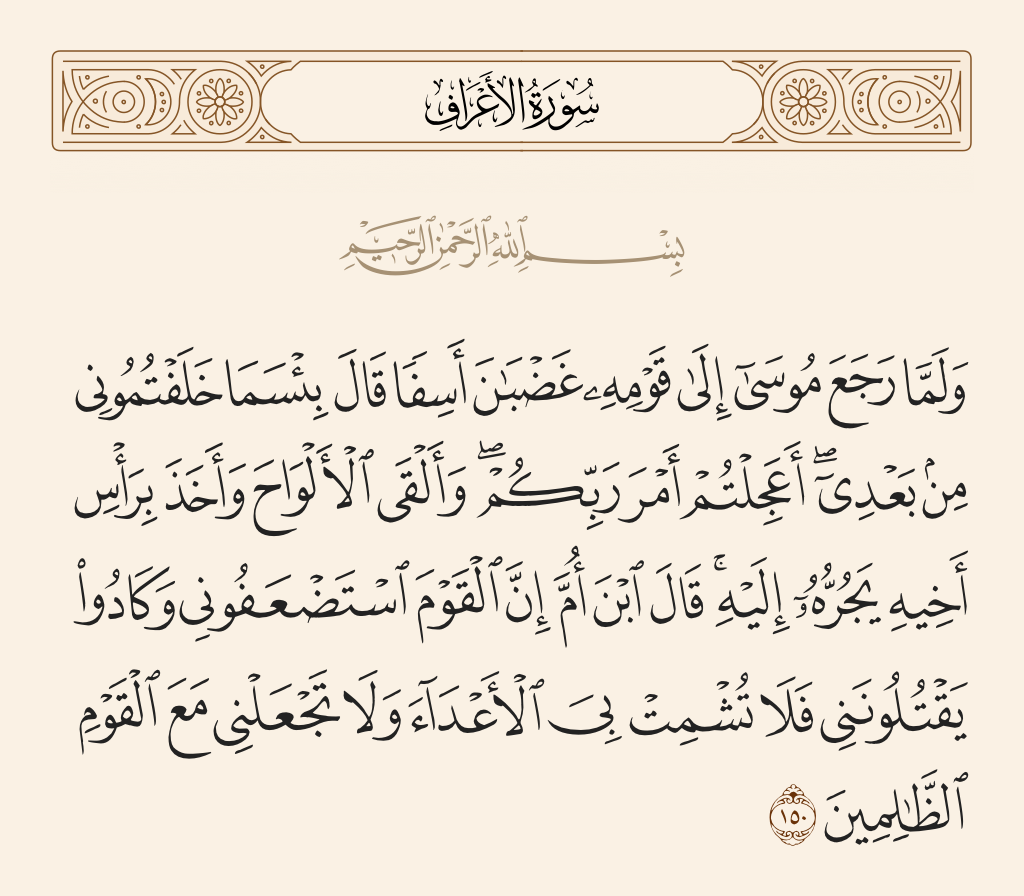Surat Al-A‘raf Verse No. 150: Reading and listening
Translation of the verse 150 from Surah Al-A‘raf : Number of verses 206 - - page 169 - Part 9.

﴾وَلَمَّا رَجَعَ مُوسَىٰٓ إِلَىٰ قَوۡمِهِۦ غَضۡبَٰنَ أَسِفٗا قَالَ بِئۡسَمَا خَلَفۡتُمُونِي مِنۢ بَعۡدِيٓۖ أَعَجِلۡتُمۡ أَمۡرَ رَبِّكُمۡۖ وَأَلۡقَى ٱلۡأَلۡوَاحَ وَأَخَذَ بِرَأۡسِ أَخِيهِ يَجُرُّهُۥٓ إِلَيۡهِۚ قَالَ ٱبۡنَ أُمَّ إِنَّ ٱلۡقَوۡمَ ٱسۡتَضۡعَفُونِي وَكَادُواْ يَقۡتُلُونَنِي فَلَا تُشۡمِتۡ بِيَ ٱلۡأَعۡدَآءَ وَلَا تَجۡعَلۡنِي مَعَ ٱلۡقَوۡمِ ٱلظَّٰلِمِينَ ﴿
[ الأعراف: 150]
And when Musa (Moses) returned to his people, angry and grieved, he said: "What an evil thing is that which you have done (i.e. worshipping the calf) during my absence. Did you hasten and go ahead as regards the matter of your Lord (you left His worship)?" And he threw down the Tablets and seized his brother by (the hair of) his head and dragged him towards him. Harun (Aaron) said: "O son of my mother! Indeed the people judged me weak and were about to kill me, so make not the enemies rejoice over me, nor put me amongst the people who are Zalimun (wrong-doers)."
English - Sahih International
And when Moses returned to his people, angry and grieved, he said, "How wretched is that by which you have replaced me after [my departure]. Were you impatient over the matter of your Lord?" And he threw down the tablets and seized his brother by [the hair of] his head, pulling him toward him. [Aaron] said, "O son of my mother, indeed the people oppressed me and were about to kill me, so let not the enemies rejoice over me and do not place me among the wrongdoing people."
Tafheem-ul-Quran by Syed Abu-al-A'la Maududi
(7:150) And when Moses returned to his people, full of wrath and sorrow, he said: 'Vile is the course you have followed in my absence. Could you not patiently wait for the decree of your Lord?' And he threw down the Tablets [of the Law] and took hold of his brother's head, dragging him to himself. Aaron said: 'My mother's son, the people overpowered me and almost killed me. So let not my enemies gloat over me, and do not number me among the wrong-doing folk.' *108
Tafheem-ul-Quran by Syed Abu-al-A'la Maududi
*108). The above Qur'anic verse absolves Aaron of the charge levelled against him by the Jews. According to the Biblical version of the story of calf-worship, however, it was Aaron who had made the golden calf for the people of Israel. To quote:
When the people saw that Moses delayed to come down from the mountain, the people gathered themselves together to Aaron, and said to him, 'Up, make up gods who shall go before us; as for this Moses, the man who brought us up out of the land of Egypt, we do not know what has become of him.' And Aaron said to them, 'Take off the rings of gold which are in the ears of your wives, your sons, and your daughters, and bring them to me.' So all the people took off the rings of gold which were in their ears, and brought them to Aaron. And he received the gold at their hand, and fashioned it with a graving tool, and made a molten calf; and they said, 'These are your gods, O Israel, who brought you up out of the land of Egypt.' When Aaron saw this, he built an altar before it; and Aaron made proclamation and said, 'Tomorrow shall be a feast to the Lord.' And they rose up early on the morrow, and offered burnt offerings and brought peace offerings; and the people sat down to eat and drink, and rose up to play (Exodus 32: 1--6).
The Qur'an, however, refutes the above account at many places and points out that it was Samiri the rebel of God rather than Aaron the Prophet who committed that heinous sin. (For details see Ta Ha 20: 90 ff.)
Strange though it may appear, the Israelites maligned the characters of those very people whom they believed to be the Messengers of God. The accusations they hurled at them included such heinous sins as polytheism, sorcery, fornication, deceit and treachery. Needless to say, indulgence in any of these sins is disgraceful for even an ordinary believer and decent human being, let alone Prophets. In the light of the history of Israeli morals, however, it is quite understandable why they maligned their own Prophets. In times of religious and moral degeneration when both the clergy and laity were steeped in sin and immorality, they tried to seek justification for their misdeeds. In order to sedate their own consciences they ascribed the very sins of which they were guilty to their Prophets and then their own inability to refrain from sins on the grounds that not even the Prophets could refrain.
The same characteristic is evident in Hinduism. When the Hindus reached the lowest point in their moral degeneration, they produced a literature which presents a very perverted image of Hindu ideals. This literature portrayed their gods, hermits and monks as crass sinners. In doing so, they suggested that since such noble people could not refrain from indulging in grave sins, ordinary mortals are inevitably bound to commit them. Moreover, a person's indulgence in immoral acts should not make him remorseful for the same acts were committed earlier by their monks and hermits.